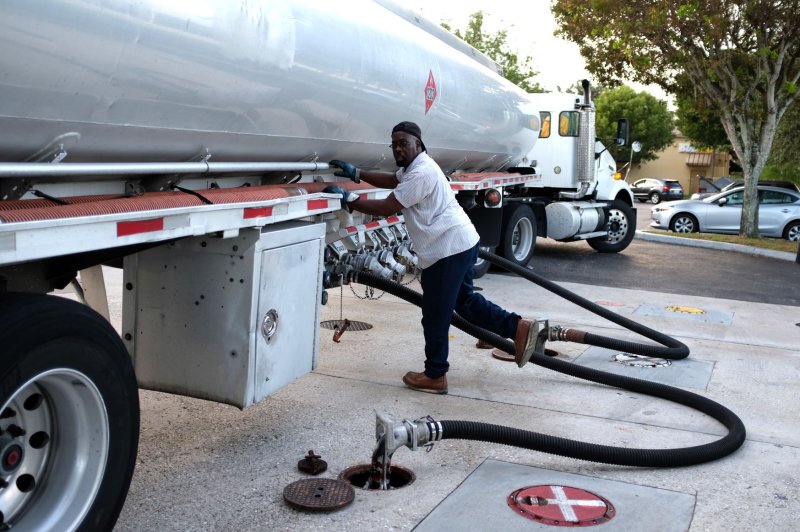Higher U.S. oil exports, low inventory in the Great Lakes states and higher crude oil prices means higher gas prices for U.S. consumers. Photo by Gary I Rothstein/UPI |
License Photo
Oct. 31 (UPI) -- Record-setting U.S. oil exports, a spike in crude oil prices and lower inventories in the Great Lakes means higher retail prices for gasoline, analysts said.
Motor club AAA reports a national average retail price for regular unleaded Tuesday at $2.47 per gallon, slightly higher than last week, but about 10 cents per gallon lower than this time in September. Gasoline prices usually move lower across the country as demand slumps at the end of summer, though hurricanes that battered the dense network of refineries in the southern U.S. in September disrupted seasonal trends.
"The price volatility can be attributed to a new trend that has emerged during October in the last few years, which is an unexpectedly steady demand for gasoline after the end of the summer driving season," AAA spokesperson Jeanette Casselano said in a statement.
AAA reports about half of the U.S. states reported an increase in the price at the pump, with the largest spikes showing up in the Great Lakes region. Ohio prices jumped 12 cents per gallon from last week and the region as a whole is showing gasoline inventories are 4.6 million barrels below what they were this time last year.
Patrick DeHaan, a senior petroleum analyst at GasBuddy, said higher crude oil prices are behind some of the spike in retail gas prices. The price for crude oil moved above $60 per barrel last week for the first time in more than two years. Meanwhile, the United States is sending more of its own crude oil to the global market, which means less is available at home.
"Without the ability to export crude oil, inventories in the U.S. would have continued to increase, keeping pressure on oil prices, but without such protection, oil is flowing out of the U.S. at record pace," he said in an emailed market report.
Markets battered by September hurricanes are recovering, meanwhile, though inventory levels moved lower last week because of higher exports. The market is still oversupplied, however, compared with last year.
While the West Coast remains the most expensive market in the country, that market too is oversupplied when compared with last year. Consumer demand, however, is holding retail gas prices higher, but stable.
"Despite the fluctuation, AAA forecasts that the national average gas price will decrease as the holidays approach," the motor club said.















